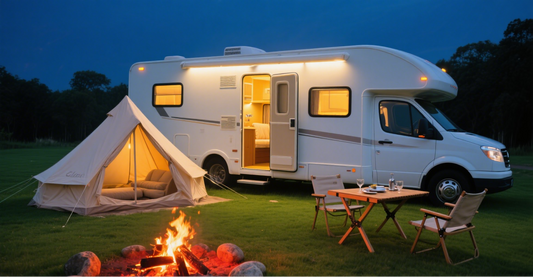Can You Use Car Batteries In a Golf Cart?
Golf carts are a convenient and eco-friendly way to navigate golf courses, beach towns, retirement communities, resorts, zoos, and parks. Whether you're a golfer, a community resident, or a fleet operator, ensuring reliable power is essential for optimal performance.
This article examines the compatibility of car batteries in golf carts, compares battery types, and provides practical guidance to help you choose the best power solution.


Understanding Golf Cart Battery Requirements
Golf carts typically operate on a 36-volt system or 48-volt system, drawing 50-70 amps during normal operation, with higher current demands (up to 200A) during acceleration or uphill travel.
Unlike regular car batteries designed for starting the engine, golf carts require deep cycle batteries that deliver steady power over extended periods.
Lithium-ion batteries, such as LiFePO4, excel in providing high continuous current. These batteries are built to handle daily deep discharging and recharging cycles, but draining below 50% can reduce battery life.
Available in 6V, 8V, or 12V configurations, they are wired in series (e.g., six 6V batteries for a 36-volt system or four 12-volt batteries for a 48-volt system) to meet voltage requirements. This design ensures consistent power delivery for golf cart needs, making them ideal for demanding applications.
Why Regular Car Batteries Are Unsuitable for Golf Carts
Using regular car batteries in a golf cart is technically possible but not recommended due to significant limitations. If you are using a car battery for golf cart use, here are some common issues you may have.
Voltage Mismatch with Car Batteries
Most golf carts require a 36-volt or 48-volt system, while regular car batteries provide only 12 volts.
Connecting three or four 12-volt batteries in series can achieve the required voltage, but car batteries may struggle to maintain stable voltage under the continuous load of a golf cart, potentially stressing the motor or controller.
This mismatch risks reduced performance and damage to the cart's electrical system, making car batteries in a golf cart is not the best option.
Performance Limitations of Use Car Batteries
Car batteries are engineered for short, high-current bursts to start an engine, not for the sustained output needed by golf carts.
Deep cycle golf cart batteries, such as lithium-ion or lead-acid, are designed for prolonged discharge and recharge cycles.
Using car batteries in a golf cart leads to rapid degradation, as they may fail after just 50-100 deep discharge cycles, compared to over 3000+ cycles for LiFePO4 batteries or 300-500 for lead-acid. This results in limited range and frequent replacements, compromising reliability.
Car Batteries Size and Fitment Challenges
Golf carts have specific battery compartments designed to securely hold deep cycle batteries. Regular car batteries often differ in size and shape, easily leading to improper fitment.
An ill-fitting battery can shift during operation, causing damage to the battery or cart and creating safety hazards. Proper fitment is essential for safe and efficient golf cart operation.
Continue reading to learn more about lithium golf cart battery installation: How To Install Lithium Battery In Your Golf Cart
Safety Risks of Using Car Batteries
Car batteries are not built to withstand the constant vibrations and jolts of golf cart use, increasing the risk of leaks or harmful gas emissions.
In contrast, deep cycle batteries, particularly LiFePO4 batteries, feature robust casings and Battery Management Systems (BMS) with protections like thermal runaway prevention, overcharging, over-discharging, and short-circuit safeguards. Using car batteries in a golf cart poses higher safety risks compared to purpose-built options.
Comparing Common Golf Cart Battery Types
Choosing the right battery requires understanding the available options. The Temgo Battery team has summarized the characteristics of common golf cart battery types below (including environmental impact) to guide you in making an informed decision.
| Battery Type | Key Features | Advantages | Disadvantages | Environmental Impact |
|---|---|---|---|---|
| Lead-Acid | Lead plates in sulfuric acid, 6V/8V/12V | Low cost, widely available, stable in cold weather | Short lifespan (500-500 cycles), heavy, requires maintenance, slow charging (8-12 hours) | High toxicity, frequent replacements increase waste |
| AGM (Absorbed Glass Mat) | Sealed lead-acid with electrolyte in fiberglass mats | Low maintenance, leak-free, suitable for wet environments | Higher cost, limited capacity improvement | Moderate toxicity, recyclable but less efficient |
| Lithium-ion (LiFePO4) | Lithium iron phosphate cells, 36V/48V | Long lifespan (3,000+ cycles), lightweight (50-60% less than lead-acid), fast charging (4-8 hours), high efficiency | Higher upfront cost, different golf cart model may need upgrades | Low toxicity, 95% recyclable, reduced waste |
Lead-Acid Batteries
Lead-acid batteries, commonly used in Yamaha golf cart batteries or Club Car models, are the most affordable deep cycle option.
They perform reliably in cold weather but have grownup have a short lifespan (300-500 cycles), are heavy, and require regular maintenance, such as monthly electrolyte checks to prevent corrosion. Their weight and slow charging (8-12 hours) make them less efficient compared to maintenance-free lithium-ion batteries.
AGM Batteries
AGM batteries, a sealed lead-acid variant, offer reduced maintenance and are leak-free, making them suitable for varied environments, including wet conditions.
However, their higher cost compared to standard lead-acid batteries provides only moderate performance improvements, limiting their appeal for golf cart owners seeking long-term efficiency.
Lithium-Ion (LiFePO4) Batteries
LiFePO4 batteries, such as 48V lithium battery or 36V lithium battery options, provide significant advantages for golf carts.
They offer 3,000-5,000 cycles at 80% depth of discharge, weigh 50-60% less than lead-acid, and can be fully charged in 4-8 hours using the charger included in the Temgo lithium golf cart battery kit.
Features like the 200A BMS ensure safety, while smart monitoring via the Temgo app or the battery's LCD screen allows you to track charge levels and optimize usage, making them ideal for fleet operators or frequent users.
Lithium-ion batteries' range (for example, a 48V 100Ah battery has a range of 40-50 miles) varies depending on terrain, vehicle weight, and driving habits.
Despite the higher upfront cost, their long lifespan and high efficiency make them the best lithium battery choice for a Club Car lithium battery or EZGO lithium battery retrofit.
Choosing the Right Battery for Your Golf Cart
Selecting the best battery involves evaluating voltage, capacity, budget, and usage needs.
Matching Voltage and Compatibility
Ensure the battery matches your golf cart's 36-volt or 48-volt system to avoid performance issues or damage. For example, a Club Car lithium battery or EZGO TXT lithium battery conversion kit must align with the cart's voltage requirements.
Verify that your golf cart's controller supports lithium-ion batteries, as some older models may require firmware updates. Lithium-ion batteries may also need a compatible charger, especially for retrofitting, to ensure seamless integration.
Evaluating Capacity Needs
Battery capacity, measured in amp-hours (Ah), determines runtime. Temgo 48V 100Ah LiFePO4 battery may achieve 40-50 miles on flat terrain but less on hilly courses or with heavy loads. High-capacity batteries are ideal for frequent users or those navigating challenging terrains, reducing charging frequency and ensuring reliable power.
Balancing Budget and Long-Term Costs
Lead-acid batteries are budget-friendly but require frequent replacements and maintenance, increasing long-term costs. For example, a lead-acid battery costing $600 may need replacement every 1-2 years, while a $1200 lithium-ion battery lasts 5-10 years, saving $1800-$2400 over a decade. Lithium-ion's minimal maintenance and high efficiency offer significant long-term savings.
Looking for a high-performance lithium-ion golf cart battery? Read Temgo's 36V and 48V lithium-ion battery selection guide to help you find the best power solution for your specific needs.
Advantages of Using Lithium-Ion Batteries for Golf Carts
LiFePO4 batteries, used in Club Car DS lithium conversion or EZGO lithium conversion kits, deliver high power output (e.g., 10.24kW for a Temgo 48V 100Ah battery), enabling smooth performance on steep hills or long courses.
Their lightweight design 50-60% lighter than lead-acid, improves cart handling and reduces motor wear. Fast charging (4-6 hours) minimizes downtime, and smart features like Bluetooth-enabled apps or LCD screens provide real-time monitoring of state of charge (SOC), voltage, and temperature.
LiFePO4 batteries use non-toxic materials and are 95% recyclable, reducing landfill waste compared to lead-acid's toxic lead content, making them a sustainable choice.
Practical Tips for Transitioning from Lead-Acid to Lithium-Ion Golf Cart Batteries
Switching to a lithium golf cart battery, such as a 36V lithium battery or 48V lithium battery, requires careful planning. Retrofitting may cost $200-$500 for wiring or tray adjustments, depending on the cart model.
Consult a professional for EZGO TXT lithium battery conversion kits or Club Car DS lithium conversion to ensure proper installation.
Verify compatibility with major brands like Club Car, Yamaha, or EZGO, and ensure the charger and controller are lithium-compatible. A battery monitor is essential, as lithium-ion batteries maintain stable voltage until near depletion, helping avoid unexpected power loss.
Conclusion
Regular car batteries are unsuitable for golf carts due to voltage mismatches, performance limitations, fitment issues, and safety risks.
Deep cycle batteries, particularly LiFePO4 batteries, provide the reliable power, durability, and efficiency needed for optimal golf cart performance.
By considering voltage, capacity, budget, and usage needs, you can select the best battery type, whether lead-acid, AGM, or lithium-ion.
Upgrade to Temgo's 48V lithium battery or 36V lithium battery to enjoy worry-free golfing with extended range and minimal maintenance.
Temgo Battery: Your Trusted Choice for Golf Cart Power Provider
Temgo's 36V and 48V lithium golf cart batteries offer 3,000-5,000 cycles and up to 40-50 miles of range, depending on terrain and load.
Featuring a 200A BMS for protection against overcharging, over-discharging, short circuits, and thermal runaway, these batteries ensure safety and durability.
Their IP65 and IP67 waterproof casing withstands harsh conditions, and the included 42.6V 20A or 56.8V 18A charger enables charging in 4-6 hours.
Smart monitoring via a touchscreen LCD or mobile app provides real-time data on SOC, voltage, and temperature, enhancing user control.
Certified by CE, FCC, and RoHS, Temgo batteries come with a five-year warranty and are compatible with major brands like Club Car, Yamaha, and EZGO. For seamless upgrades, Temgo's EZGO lithium conversion kits or Club Car 48V lithium conversion packages include chargers, LCD displays, and mounting straps. Visit Temgo shop to explore eco-friendly, high-performance solutions tailored to your golf cart needs.


